#zerbinetta
Explore tagged Tumblr posts
Text


November 18. 1891 the Hungarian Soprano Maria Ivogün (1891-1987) was born. She was well known for Mozart and a favorite Soprano from Richard Strauss. Here we see two documents from her. A original letter she send to the Steinway and Sons 1922. The photo shows Ivogün as Zerbinetta and is signed by herself and the Greek Mezzo-Soprano Alexandra Trianti (1901-1977). The Music-Hall in Athen is named Alexandra Trianti Hall. A rare double autograph. Take a look on the biography from Maria Ivogün.
#classical music#opera#music history#bel canto#composer#classical composer#aria#classical studies#maestro#chest voice#Maria Ivogün#Ivogün#soprano#classical musician#classical musicians#classical voice#classical history#classical art#musician#musicians#music education#music theory#diva#prima donna#Covent Garden#La Scala#Royal Opera House
9 notes
·
View notes
Video
youtube
Sumi Jo - R.Strauss - Ariadne auf Naxos - Zerbinetta
정말 감탄을 금할 수 없음
0 notes
Text

flcl inspired Zerbinetta from @divinecommandtheory
1 note
·
View note
Quote
Strauss – Overture for the Prologue of Ariadne auf Naxos (1912) I keep coming back to Richard Strauss’ less ‘popular’ operas. During his lifetime many of them were somewhat dismissed for their ‘conservative’ writing. It seems that Strauss was going into a more jarring and angst ridden Modernism with his operas Salome (1905) and Elektra (1908), but then betrayed that direction with the very gushy romantic Rosenkavalier (1910). I think this lower opinion of Strauss has more to do with the time he lived in rather than the music itself. Not to mention that this ‘heavy/lighthearted’ florid style continued through both World Wars. It’s hard for me not to love his music because of it’s unusual mix of being hyper-romantic and also clear and easy to follow. What Strauss did was the seemingly impossible task of synthesizing Wagner (free floating harmonies, thick orchestral textures, and long scale structure) with Mozart (clarity, grace, lyricism, and more grounded functioning tonality). This is the opening of Strauss’ comic opera Ariadne auf Naxos. The confusing title for this post is due to the opera’s structure; It is an opera within an opera. The opera is in two parts, first part is the prologue which gives us the backstory where a composer has been hired to stage one of his operas at some very super rich Viennese man’s house. He is deeply offended to learn that the patron has also hired a burlesque dance troop to perform after his opera. Offended because (and I’m pretty sure Strauss is satirizing the Romantic-minded young artist who takes his own work too seriously) his opera, Ariadne of Naxos, is supposed to be a super serious tragedy and having a burlesque dance afterward shows how the patron and audience don’t care that much for ‘serious’ art, and may even look forward to the half naked women more than the Grecian music-drama. The opera company and dance company argue over who gets to play first. The situation gets worse when the patron’s butler informs everyone that his dinner party ended up going later than expected, and since he’s paid for both acts already and wants them to perform, he decided he wants the opera and the burlesque to happen at the same time. The composer is angry but his teacher encourages him to comply. And the lead of the burlesque show, a risqué comedian named Zerbinetta, charms him into changing the opera to include scenes for her. The second part is the opera Ariadne of Naxos, where Ariadne has been abandoned on the isle of Naxos by her former lover and hero Theseus. Zerbinetta and other nymphs (the burlesque dancers) try to sing and cheer Ariadne up but they can’t get her out of her depression. Zerbinetta tells her the best way to get over one man is to find another, and encourages her to flirt with a clown Harlequin. But then a stranger comes to the island, who turns out to be Bacchus the god of wine, chaos, and ‘hedonism’. Ariadne and Bacchus fall in love, the end. Despite how this opera is somewhat minuscule (in comparison to all opera ever, let alone Strauss’), it is the genius combination of Wagner (a ‘super-serious’ philosophical music-drama based on classical antiquity where love transfigures the soul), Mozart (lighthearted comedy, flirting between men and women who don’t understand each other, and an optimistic idealization of a classical pastorale) and Strauss (a metafictional story about an opera within the opera where characters discuss the nature of opera and relationship between artist and audience, the kinds of themes that would be best exemplified in Capriccio). But really the only reason I’m sharing this is because the main melody is stuck in my head, the perfect Straussian melody; optimistic and upbeat, goofy-sounding accidentals, very sentimental writing based on subtle diatonic dissonances, and coming back again and again in different waves of great orchestral writing.
mikrokosmos: Strauss – Overture for the Prologue of Ariadne auf Naxos (1912) I keep coming back to Richard Strauss’ less ‘popular’ operas. During his lifetime many of them were somewhat dismissed for their ‘conservative’ writing. It seems that Strauss was going into a more jarring and angst ridden Modernism with his operas Salome (1905) and…
0 notes
Quote
Strauss – Overture for the Prologue of Ariadne auf Naxos (1912) I keep coming back to Richard Strauss’ less ‘popular’ operas. During his lifetime many of them were somewhat dismissed for their ‘conservative’ writing. It seems that Strauss was going into a more jarring and angst ridden Modernism with his operas Salome (1905) and Elektra (1908), but then betrayed that direction with the very gushy romantic Rosenkavalier (1910). I think this lower opinion of Strauss has more to do with the time he lived in rather than the music itself. Not to mention that this ‘heavy/lighthearted’ florid style continued through both World Wars. It’s hard for me not to love his music because of it’s unusual mix of being hyper-romantic and also clear and easy to follow. What Strauss did was the seemingly impossible task of synthesizing Wagner (free floating harmonies, thick orchestral textures, and long scale structure) with Mozart (clarity, grace, lyricism, and more grounded functioning tonality). This is the opening of Strauss’ comic opera Ariadne auf Naxos. The confusing title for this post is due to the opera’s structure; It is an opera within an opera. The opera is in two parts, first part is the prologue which gives us the backstory where a composer has been hired to stage one of his operas at some very super rich Viennese man’s house. He is deeply offended to learn that the patron has also hired a burlesque dance troop to perform after his opera. Offended because (and I’m pretty sure Strauss is satirizing the Romantic-minded young artist who takes his own work too seriously) his opera, Ariadne of Naxos, is supposed to be a super serious tragedy and having a burlesque dance afterward shows how the patron and audience don’t care that much for ‘serious’ art, and may even look forward to the half naked women more than the Grecian music-drama. The opera company and dance company argue over who gets to play first. The situation gets worse when the patron’s butler informs everyone that his dinner party ended up going later than expected, and since he’s paid for both acts already and wants them to perform, he decided he wants the opera and the burlesque to happen at the same time. The composer is angry but his teacher encourages him to comply. And the lead of the burlesque show, a risqué comedian named Zerbinetta, charms him into changing the opera to include scenes for her. The second part is the opera Ariadne of Naxos, where Ariadne has been abandoned on the isle of Naxos by her former lover and hero Theseus. Zerbinetta and other nymphs (the burlesque dancers) try to sing and cheer Ariadne up but they can’t get her out of her depression. Zerbinetta tells her the best way to get over one man is to find another, and encourages her to flirt with a clown Harlequin. But then a stranger comes to the island, who turns out to be Bacchus the god of wine, chaos, and ‘hedonism’. Ariadne and Bacchus fall in love, the end. Despite how this opera is somewhat minuscule (in comparison to all opera ever, let alone Strauss’), it is the genius combination of Wagner (a ‘super-serious’ philosophical music-drama based on classical antiquity where love transfigures the soul), Mozart (lighthearted comedy, flirting between men and women who don’t understand each other, and an optimistic idealization of a classical pastorale) and Strauss (a metafictional story about an opera within the opera where characters discuss the nature of opera and relationship between artist and audience, the kinds of themes that would be best exemplified in Capriccio). But really the only reason I’m sharing this is because the main melody is stuck in my head, the perfect Straussian melody; optimistic and upbeat, goofy-sounding accidentals, very sentimental writing based on subtle diatonic dissonances, and coming back again and again in different waves of great orchestral writing.
mikrokosmos: Strauss – Overture for the Prologue of Ariadne auf Naxos (1912) I keep coming back to Richard Strauss’ less ‘popular’ operas. During his lifetime many of them were somewhat dismissed for their ‘conservative’ writing. It seems that Strauss was going into a more jarring and angst ridden Modernism with his operas Salome (1905) and…
0 notes
Quote
Strauss – Overture for the Prologue of Ariadne auf Naxos (1912) I keep coming back to Richard Strauss’ less ‘popular’ operas. During his lifetime many of them were somewhat dismissed for their ‘conservative’ writing. It seems that Strauss was going into a more jarring and angst ridden Modernism with his operas Salome (1905) and Elektra (1908), but then betrayed that direction with the very gushy romantic Rosenkavalier (1910). I think this lower opinion of Strauss has more to do with the time he lived in rather than the music itself. Not to mention that this ‘heavy/lighthearted’ florid style continued through both World Wars. It’s hard for me not to love his music because of it’s unusual mix of being hyper-romantic and also clear and easy to follow. What Strauss did was the seemingly impossible task of synthesizing Wagner (free floating harmonies, thick orchestral textures, and long scale structure) with Mozart (clarity, grace, lyricism, and more grounded functioning tonality). This is the opening of Strauss’ comic opera Ariadne auf Naxos. The confusing title for this post is due to the opera’s structure; It is an opera within an opera. The opera is in two parts, first part is the prologue which gives us the backstory where a composer has been hired to stage one of his operas at some very super rich Viennese man’s house. He is deeply offended to learn that the patron has also hired a burlesque dance troop to perform after his opera. Offended because (and I’m pretty sure Strauss is satirizing the Romantic-minded young artist who takes his own work too seriously) his opera, Ariadne of Naxos, is supposed to be a super serious tragedy and having a burlesque dance afterward shows how the patron and audience don’t care that much for ‘serious’ art, and may even look forward to the half naked women more than the Grecian music-drama. The opera company and dance company argue over who gets to play first. The situation gets worse when the patron’s butler informs everyone that his dinner party ended up going later than expected, and since he’s paid for both acts already and wants them to perform, he decided he wants the opera and the burlesque to happen at the same time. The composer is angry but his teacher encourages him to comply. And the lead of the burlesque show, a risqué comedian named Zerbinetta, charms him into changing the opera to include scenes for her. The second part is the opera Ariadne of Naxos, where Ariadne has been abandoned on the isle of Naxos by her former lover and hero Theseus. Zerbinetta and other nymphs (the burlesque dancers) try to sing and cheer Ariadne up but they can’t get her out of her depression. Zerbinetta tells her the best way to get over one man is to find another, and encourages her to flirt with a clown Harlequin. But then a stranger comes to the island, who turns out to be Bacchus the god of wine, chaos, and ‘hedonism’. Ariadne and Bacchus fall in love, the end. Despite how this opera is somewhat minuscule (in comparison to all opera ever, let alone Strauss’), it is the genius combination of Wagner (a ‘super-serious’ philosophical music-drama based on classical antiquity where love transfigures the soul), Mozart (lighthearted comedy, flirting between men and women who don’t understand each other, and an optimistic idealization of a classical pastorale) and Strauss (a metafictional story about an opera within the opera where characters discuss the nature of opera and relationship between artist and audience, the kinds of themes that would be best exemplified in Capriccio). But really the only reason I’m sharing this is because the main melody is stuck in my head, the perfect Straussian melody; optimistic and upbeat, goofy-sounding accidentals, very sentimental writing based on subtle diatonic dissonances, and coming back again and again in different waves of great orchestral writing.
mikrokosmos: Strauss – Overture for the Prologue of Ariadne auf Naxos (1912) I keep coming back to Richard Strauss’ less ‘popular’ operas. During his lifetime many of them were somewhat dismissed for their ‘conservative’ writing. It seems that Strauss was going into a more jarring and angst ridden Modernism with his operas Salome (1905) and…
0 notes
Quote
Strauss – Overture for the Prologue of Ariadne auf Naxos (1912) I keep coming back to Richard Strauss’ less ‘popular’ operas. During his lifetime many of them were somewhat dismissed for their ‘conservative’ writing. It seems that Strauss was going into a more jarring and angst ridden Modernism with his operas Salome (1905) and Elektra (1908), but then betrayed that direction with the very gushy romantic Rosenkavalier (1910). I think this lower opinion of Strauss has more to do with the time he lived in rather than the music itself. Not to mention that this ‘heavy/lighthearted’ florid style continued through both World Wars. It’s hard for me not to love his music because of it’s unusual mix of being hyper-romantic and also clear and easy to follow. What Strauss did was the seemingly impossible task of synthesizing Wagner (free floating harmonies, thick orchestral textures, and long scale structure) with Mozart (clarity, grace, lyricism, and more grounded functioning tonality). This is the opening of Strauss’ comic opera Ariadne auf Naxos. The confusing title for this post is due to the opera’s structure; It is an opera within an opera. The opera is in two parts, first part is the prologue which gives us the backstory where a composer has been hired to stage one of his operas at some very super rich Viennese man’s house. He is deeply offended to learn that the patron has also hired a burlesque dance troop to perform after his opera. Offended because (and I’m pretty sure Strauss is satirizing the Romantic-minded young artist who takes his own work too seriously) his opera, Ariadne of Naxos, is supposed to be a super serious tragedy and having a burlesque dance afterward shows how the patron and audience don’t care that much for ‘serious’ art, and may even look forward to the half naked women more than the Grecian music-drama. The opera company and dance company argue over who gets to play first. The situation gets worse when the patron’s butler informs everyone that his dinner party ended up going later than expected, and since he’s paid for both acts already and wants them to perform, he decided he wants the opera and the burlesque to happen at the same time. The composer is angry but his teacher encourages him to comply. And the lead of the burlesque show, a risqué comedian named Zerbinetta, charms him into changing the opera to include scenes for her. The second part is the opera Ariadne of Naxos, where Ariadne has been abandoned on the isle of Naxos by her former lover and hero Theseus. Zerbinetta and other nymphs (the burlesque dancers) try to sing and cheer Ariadne up but they can’t get her out of her depression. Zerbinetta tells her the best way to get over one man is to find another, and encourages her to flirt with a clown Harlequin. But then a stranger comes to the island, who turns out to be Bacchus the god of wine, chaos, and ‘hedonism’. Ariadne and Bacchus fall in love, the end. Despite how this opera is somewhat minuscule (in comparison to all opera ever, let alone Strauss’), it is the genius combination of Wagner (a ‘super-serious’ philosophical music-drama based on classical antiquity where love transfigures the soul), Mozart (lighthearted comedy, flirting between men and women who don’t understand each other, and an optimistic idealization of a classical pastorale) and Strauss (a metafictional story about an opera within the opera where characters discuss the nature of opera and relationship between artist and audience, the kinds of themes that would be best exemplified in Capriccio). But really the only reason I’m sharing this is because the main melody is stuck in my head, the perfect Straussian melody; optimistic and upbeat, goofy-sounding accidentals, very sentimental writing based on subtle diatonic dissonances, and coming back again and again in different waves of great orchestral writing.
mikrokosmos: Strauss – Overture for the Prologue of Ariadne auf Naxos (1912) I keep coming back to Richard Strauss’ less ‘popular’ operas. During his lifetime many of them were somewhat dismissed for their ‘conservative’ writing. It seems that Strauss was going into a more jarring and angst ridden Modernism with his operas Salome (1905) and…
0 notes
Text
also: Zerbinetta definitely gives off “closeted queer woman” vibes and I’d love to see a production where the Composer is a woman and they kiss
#opera#opera tag#Ariadne auf Naxos#Zerbinetta#the Composer#so many gay vibes#Isabel Leonard#Brenda Rae#Met Opera#Richard Strauss
17 notes
·
View notes
Photo
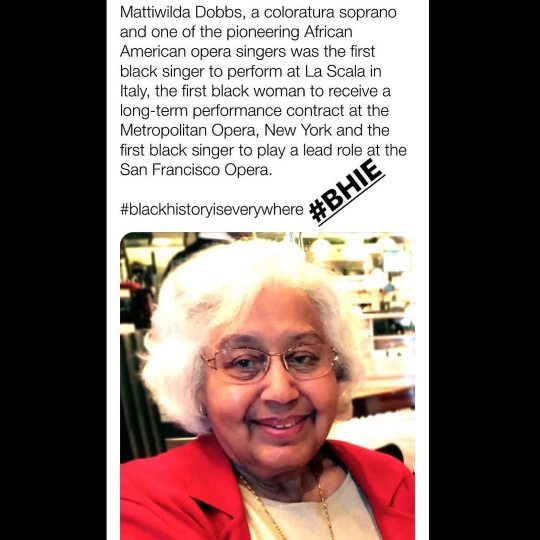
Black History All Year 2021 . . Dobbs began singing and playing the piano as a child. As a young adult, she studied voice under Naomi Maise while attending Spelman College. She graduated in 1946 as valedictorian, then moved to New York to study music under Mme. Lotte Leonard; she also enrolled at Columbia University, where she earned an M.A. in Spanish in 1950. While in school she received several musical scholarships, and after graduating in 1950 she went to Paris on a two year fellowship to study with Pierre Viernac. In 1951 she won first prize at the Geneva Competition in Switzerland. . . In 1952, Dobbs began her professional career with appearances as Stravinsky’s Nightingale at the Holland Festival in Amsterdam. She also performed several other prestigious leading roles between 1952 and 1954 including the Queen of the Night in Mozart’s The Magic Flute at Genoa, Zerbinetta in Strauss’ Ariadne auf Naxos at the Glyndebounce Opera Festival, Gilda in Rigoletto, and Olympia in The Tales of Hoffman at the Royal Opera House in London, as well as the Queen of Shemakhan in Le Coq d’Or. For this last performance, she was awarded the Swedish Order of the North Star by King Gustav VI. Dobbs sang the role of Zerbinetta again in her first appearance in the United States at New York’s Town Hall on March 8, 1954 and received great critical acclaim. Throughout her career, she received praise for her exceptional range and skill at interpreting her roles, as well as her pioneering appearances as the first black singer to sing at La Scala in Italy and the first black soprano to sing at the Metropolitan Opera, where she appeared as Gilda in 1956. . . #Funfact-Dobbs aunt of Maynard Jackson, the first African American mayor of Atlanta, sang at his inauguration in January 1974. . . #singersspotlight #dobbs #maynardjackson #jackson #mattiwildadobbs #italy #Legendary #Zerbinetta #LaScala #MetropolitanOpera #Zerbinetta #valedictorian #spelmancollege (at Peace Gardens) https://www.instagram.com/p/CO3oTi9pXk4/?igshid=1txr31dxlgpda
#funfact#singersspotlight#dobbs#maynardjackson#jackson#mattiwildadobbs#italy#legendary#zerbinetta#lascala#metropolitanopera#valedictorian#spelmancollege
0 notes
Text
Glass Shatterers! Erna Sack - J. Strauss II: Voices of Spring, 1937 Live, High F6, G6, B6
THE SONGBIRD: Erna Sack (1898 - 1972) was born in Berlin and studied music in Prague. She was signed by Bruno Walter to sing small roles at the Berlin State Opera in 1928 but it wasn't until 1930 that her stratospheric high notes helped her become a star soprano across Germany as Norina, Gilda, and Zerbinetta (Richard Strauss composed a new cadenza for her that seems to have been lost). In 1935 she made her first series of concert tours — to Austria, the Netherlands, France, and the United Kingdom — and signed a recording contract with Telefunken. Sack appeared in German operetta films and continued to concertize internationally until she retired in 1957. I didn't think I'd be able to post any selections of Erna Sack since all of her recordings seemed to be on YouTube already and I only post unique content, but I did not find any listing of this live rendition of the “Voices of Spring” waltz, with her signature flourish from High G up to a series of staccato volleys on High B6, as well as a final High F.
THE MUSIC: Johann Strauss II wrote "Frühlingsstimmen" (Voices of Spring) in 1882 for German soprano Bertha Schwartz (aka Bianca Bianchi); she premiered this concert piece at a charity performance in Vienna. The German lyrics about the sounds of nature and warbling birds are by Richard Genée. Strauss came from a family of Viennese composers in the 19th century who specialized in sophisticated waltzes and light music, but Johann II's music was (and remains) the most popular. He was known as "The Waltz King" in his time and most of the Viennese waltzes we hum now were composed by him -- not to mention his enormously successful and genre-defining operettas such as "Die Fledermaus."
#classical music#opera#music history#bel canto#composer#classical composer#aria#classical studies#maestro#chest voice#Erna Sack#lyric coloratura soprano#soprano#the German Nightingale#German Nightingale#the Nightingale#Die deutsche Nachtigall#Die Nachtigall#Johann Strauss#Frühlingsstimmen#Voices of Spring#classical musician#classical musicians#classical history#history of music#historian of music#musician#musicians#diva#prima donna
3 notes
·
View notes
Photo
WHAAAAAT??? WHY AM I SEEING THIS ONLY NOW FOR THE FIRST TIME. DIANA AS ZERBINETTA AND JOYCE THE COMPOSER IN A STAGE VERSION

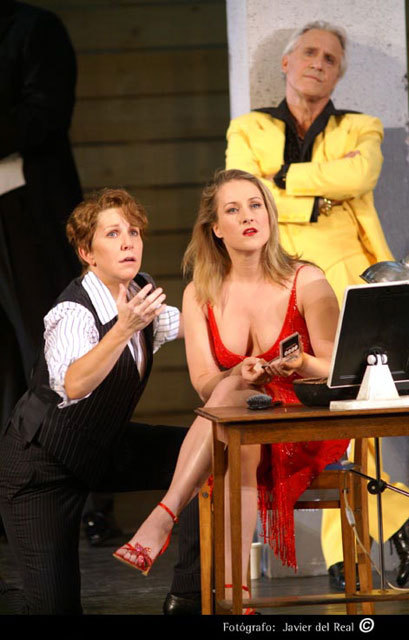
What is air.
#joyce didonato#mezzosoprano#diana damrau#soprano#lyric#coloratura#ariadne auf naxos#strauss#the composer#zerbinetta#teatro real#madrid#2006
96 notes
·
View notes
Note
Hi! I'm sending this to all my fave L/Misa authors because I trust your taste: what are you favourite Lawmane fics posted outside of Ao3? Alternatively, is there some old stories you remember reading but can't find again? 👀
I'm actually currently working on a pretty exhaustive list of L/Misa fics that I like on AO3 and FFN (don't know any from any other sites), so I'm gonna wait until the list is done to post all my recommendations. But to name a few, some stories I like on FFN are:
Dynamism by keem (~51k words, smutty, one of the bigger influences on me when I was writing Liability)
Serious by Zerbinetta (~68k words, no smut, never finished but most of the plot is wrapped up so it's not as frustrating as Rewrite, basically a mashup of Death Note and Legally Blonde, with Misa as Elle Woods)
Breathless by thinking of england (~15k words, smutty, they write L a bit OOC and honestly kind of like a fuckboy, but it's still pretty decent stuff)
Before the Storm by Tokebi211 (~3k words, no actual smut but still kinda risque, Misa is released from custody and returns to her apartment to find L waiting for her, and they have a bit of a confrontation)
Arbitrium by MissDementia (~5k words, focuses on Misa's character and her thoughts about L and Light)
The Case He Could Only Watch by Sorentense (~5k words, mostly platonic with some interest from L, the most serious exploration I've found of the possibility that Misa has borderline personality disorder)
Believe by MiyakoHasegawa (~16k words, left unfinished, the setup isn't very clear or believable (for some reason, Light isn't there anymore, it's never explained, but Misa is still spending time with L and they start a relationship), but I like it because it gives a lot of cute/funny moments about what L and Misa trying to date would actually be like)
I know some people also like End Games. I enjoyed the first 15 chapters but had to stop reading because it hit a major trigger for me, but if you don't share my particular trigger, you'll probably enjoy it.
60 notes
·
View notes
Text
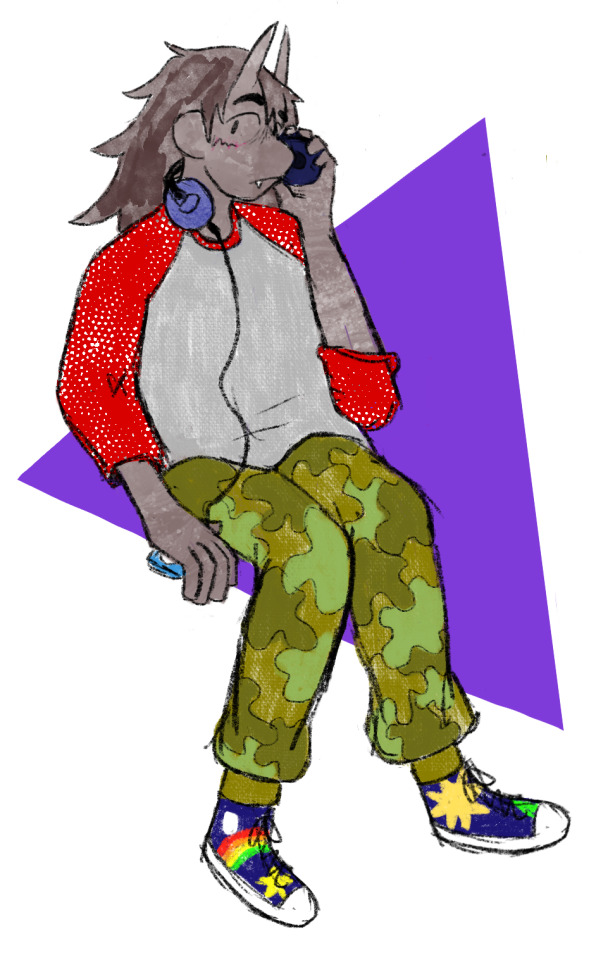
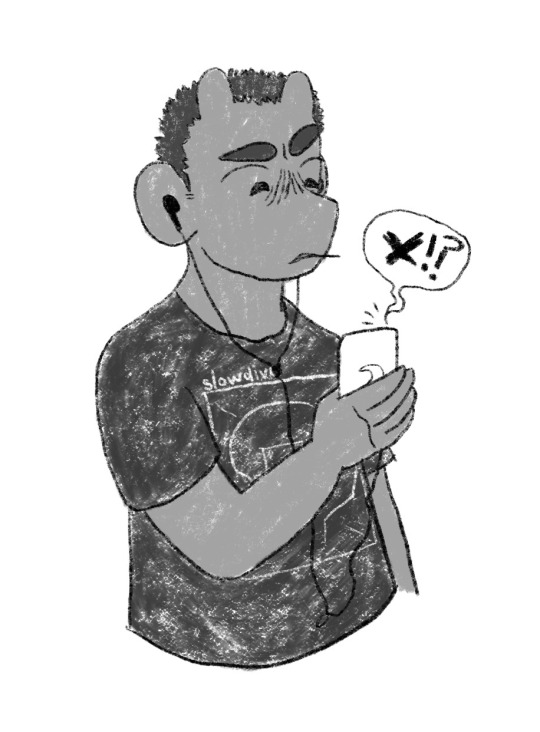
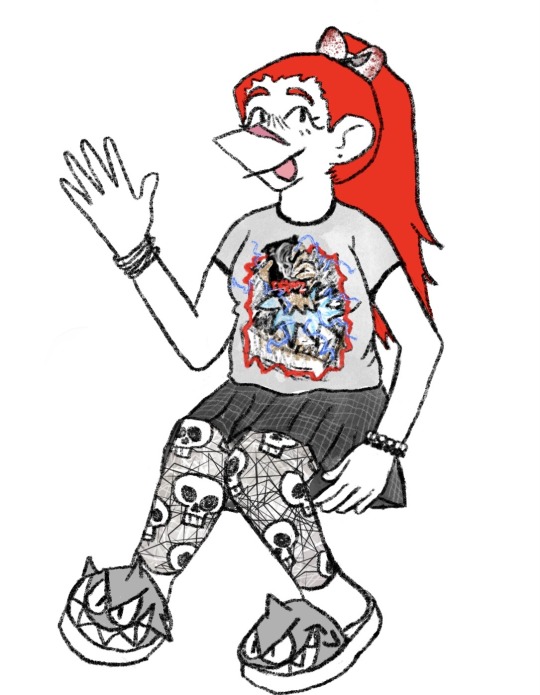
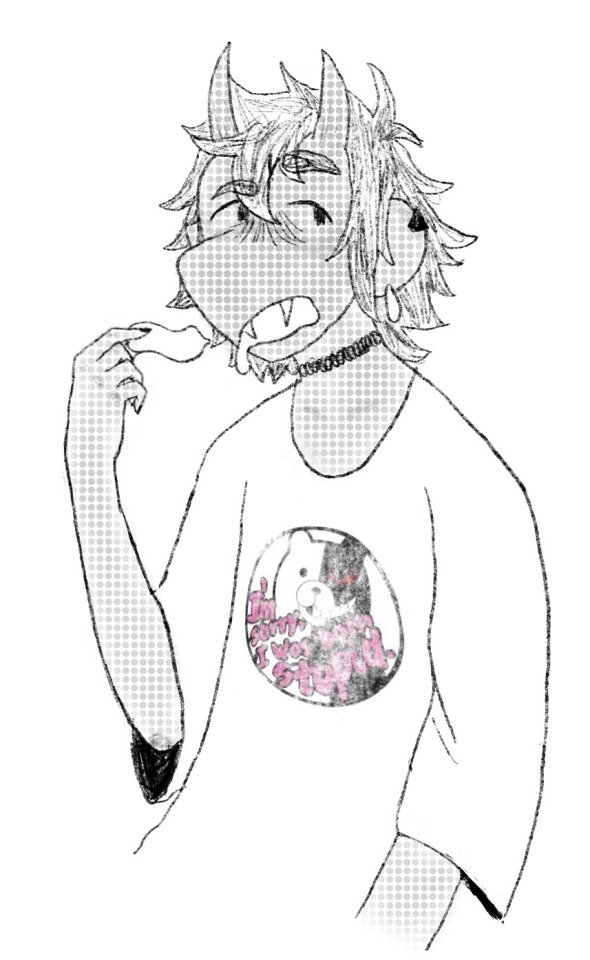
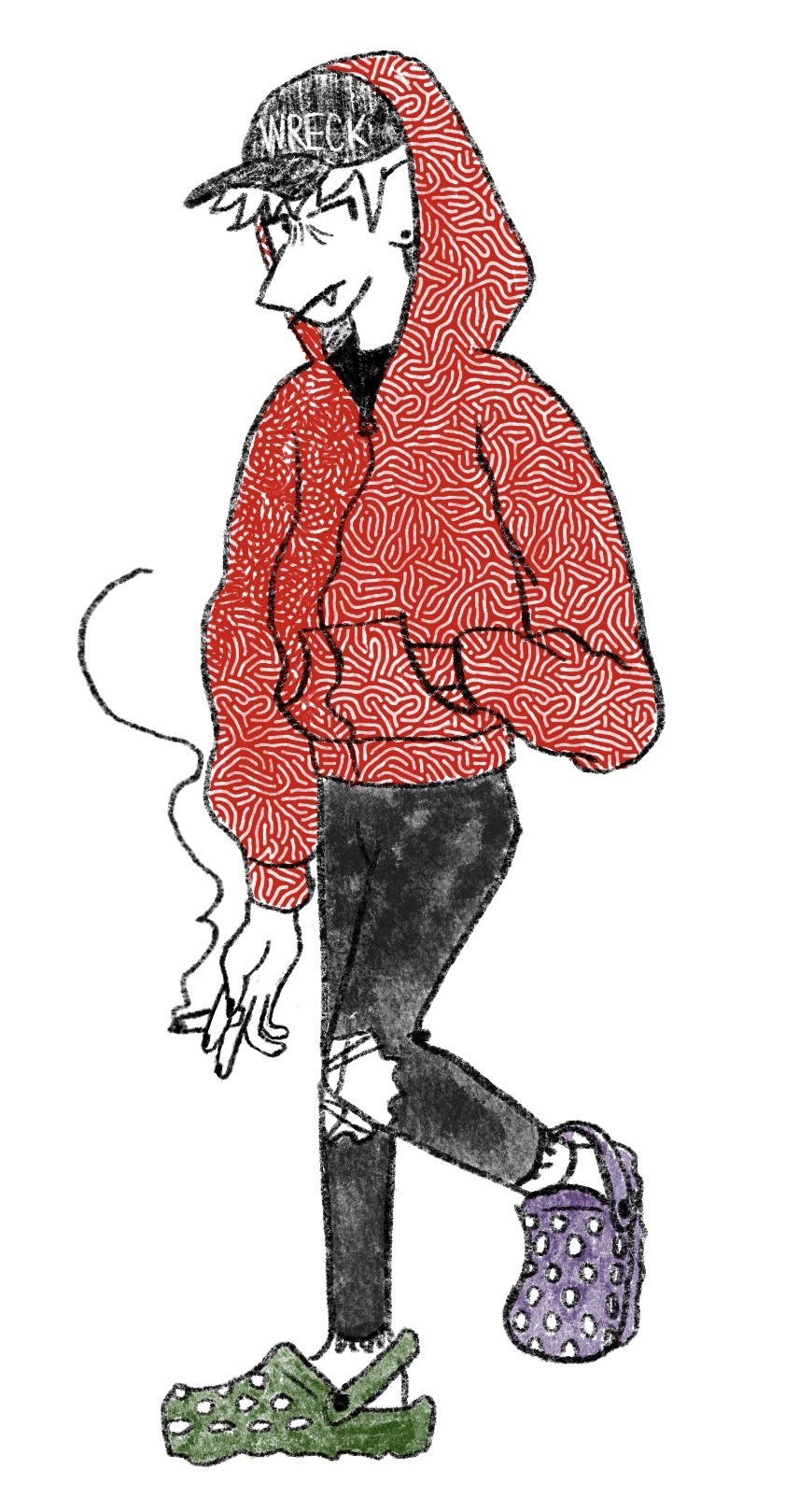
Zerbinetta, Harvey, Tooth, Vincent, and Lionel (in my clothes) from @divinecommandtheory by @zitboy
12 notes
·
View notes
Text
youtube
Strauss - Overture for the Prologue of Ariadne auf Naxos (1912)
I keep coming back to Richard Strauss' less 'popular' operas. During his lifetime many of them were somewhat dismissed for their 'conservative' writing. It seems that Strauss was going into a more jarring and angst ridden Modernism with his operas Salome (1905) and Elektra (1908), but then betrayed that direction with the very gushy romantic Rosenkavalier (1910). I think this lower opinion of Strauss has more to do with the time he lived in rather than the music itself. Not to mention that this 'heavy/lighthearted' florid style continued through both World Wars. It's hard for me not to love his music because of it's unusual mix of being hyper-romantic and also clear and easy to follow. What Strauss did was the seemingly impossible task of synthesizing Wagner (free floating harmonies, thick orchestral textures, and long scale structure) with Mozart (clarity, grace, lyricism, and more grounded functioning tonality). This is the opening of Strauss' comic opera Ariadne auf Naxos. The confusing title for this post is due to the opera's structure; It is an opera within an opera. The opera is in two parts, first part is the prologue which gives us the backstory where a composer has been hired to stage one of his operas at some very super rich Viennese man's house. He is deeply offended to learn that the patron has also hired a burlesque dance troop to perform after his opera. Offended because (and I'm pretty sure Strauss is satirizing the Romantic-minded young artist who takes his own work too seriously) his opera, Ariadne of Naxos, is supposed to be a super serious tragedy and having a burlesque dance afterward shows how the patron and audience don't care that much for 'serious' art, and may even look forward to the half naked women more than the Grecian music-drama. The opera company and dance company argue over who gets to play first. The situation gets worse when the patron's butler informs everyone that his dinner party ended up going later than expected, and since he's paid for both acts already and wants them to perform, he decided he wants the opera and the burlesque to happen at the same time. The composer is angry but his teacher encourages him to comply. And the lead of the burlesque show, a risqué comedian named Zerbinetta, charms him into changing the opera to include scenes for her. The second part is the opera Ariadne of Naxos, where Ariadne has been abandoned on the isle of Naxos by her former lover and hero Theseus. Zerbinetta and other nymphs (the burlesque dancers) try to sing and cheer Ariadne up but they can't get her out of her depression. Zerbinetta tells her the best way to get over one man is to find another, and encourages her to flirt with a clown Harlequin. But then a stranger comes to the island, who turns out to be Bacchus the god of wine, chaos, and 'hedonism'. Ariadne and Bacchus fall in love, the end. Despite how this opera is somewhat minuscule (in comparison to all opera ever, let alone Strauss'), it is the genius combination of Wagner (a 'super-serious' philosophical music-drama based on classical antiquity where love transfigures the soul), Mozart (lighthearted comedy, flirting between men and women who don't understand each other, and an optimistic idealization of a classical pastorale) and Strauss (a metafictional story about an opera within the opera where characters discuss the nature of opera and relationship between artist and audience, the kinds of themes that would be best exemplified in Capriccio). But really the only reason I'm sharing this is because the main melody is stuck in my head, the perfect Straussian melody; optimistic and upbeat, goofy-sounding accidentals, very sentimental writing based on subtle diatonic dissonances, and coming back again and again in different waves of great orchestral writing.
#Strauss#ariadne auf naxos#music#classical#opera#opera music#overture#opera overture#modern#modernism#postromantic#postromanticism#postromantic music#post romantic music#post romantic#post romanticism#modern music#modernist music#orchestra music#orchestra#Richard Strauss#Strauss Ariadne auf Naxos#Youtube
25 notes
·
View notes
Note
5 more opera headcanons 🥺
this one's a little random but based on a story I generated a verrrrrrry long time ago after watching my second Carmen production. there's that spoken-role character known simply as "the guide" who leads Micaëla to where Don José is in Act 3. when I was younger I thought to myself, it would have taken a bit of time for them to get there and there must have been some bonding along the way. I like to imagine they became friends after that and the guide was there to support Micaëla who was probably a little traumatized by the events of the end of the opera.
Ascanio and Fieramosca actually become kind of friends after Balducci gives up and stops pushing Fieramosca around and Fieramosca realizes he can't pursue Teresa anymore and fully embraces his identity as Disaster Bi and he and Ascanio actually have something to talk about now that Fieramosca has time for art again. Cellini isn't precisely thrilled and makes sure Ascanio knows he is still his mentor. Ascanio doesn't mind the extra attention.
The Composer and Zerbinetta start dating and are very cute together. Also they kiss a lot, screw you homophobic stage directors.
Idamante and Ilia adopt a bunch of the kids who were orphaned during the Trojan War.
Papageno and Papagena have exactly as many kids as they planned and they all live happily in Papageno's cabin in the woods (which does need to be expanded a bit to accommodate the growing family). they do come up with some more original names though. Pamina and Tamino come over to babysit sometimes when they need a break from being Royal and Papageno and Papagena need some quality time. they like birdwatching and taking long walks in the woods and climbing trees and stargazing. their kids all grow up with a deep knowledge and love of nature in all its forms.
thanks!
5 notes
·
View notes
